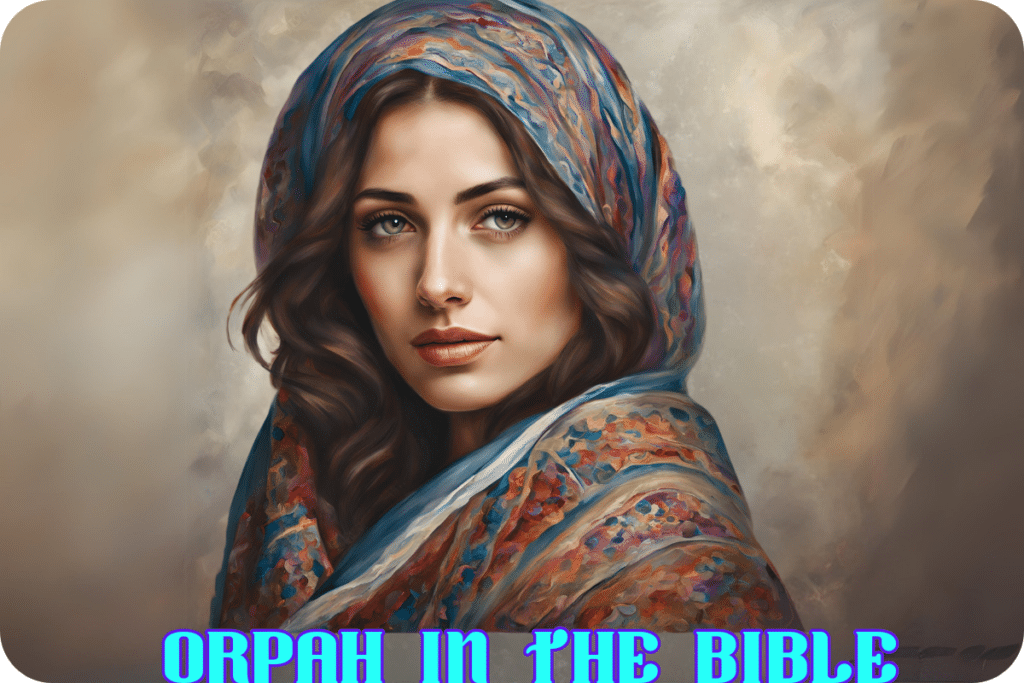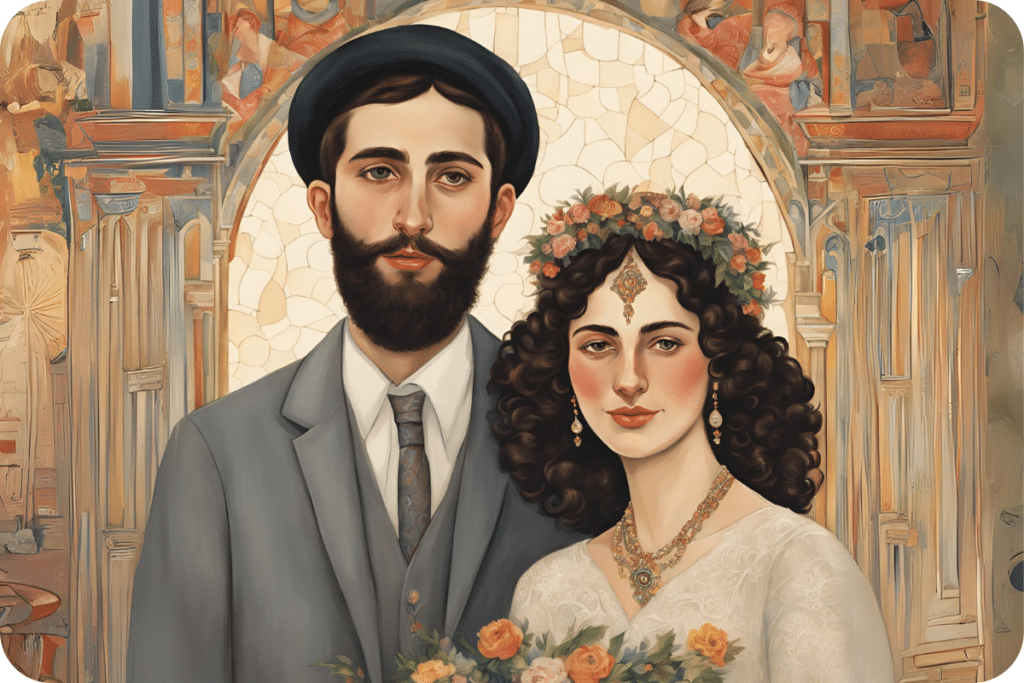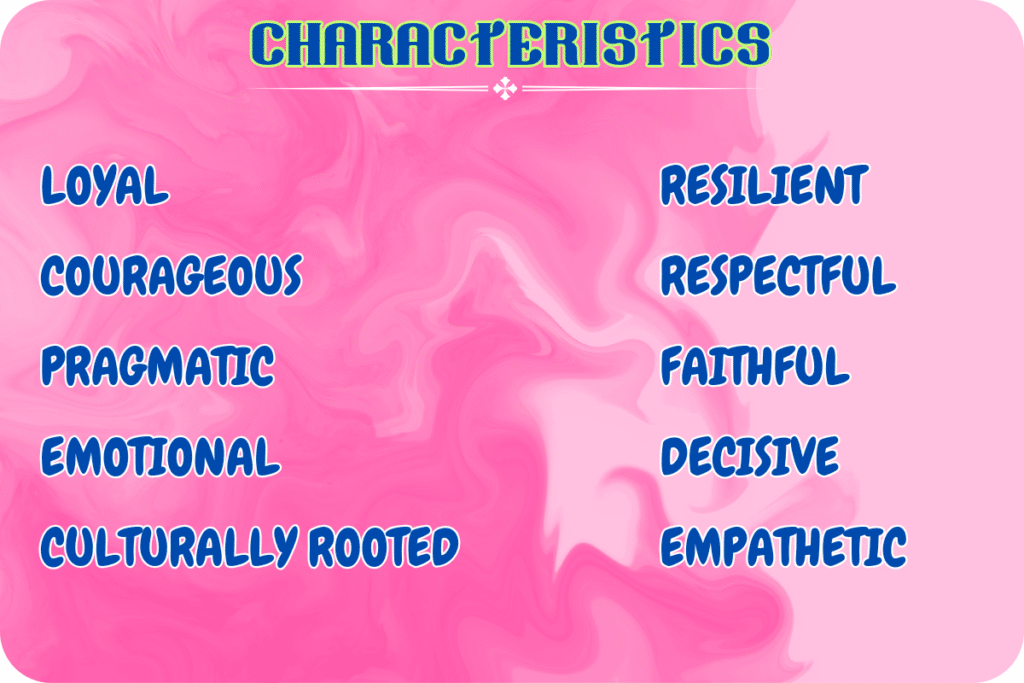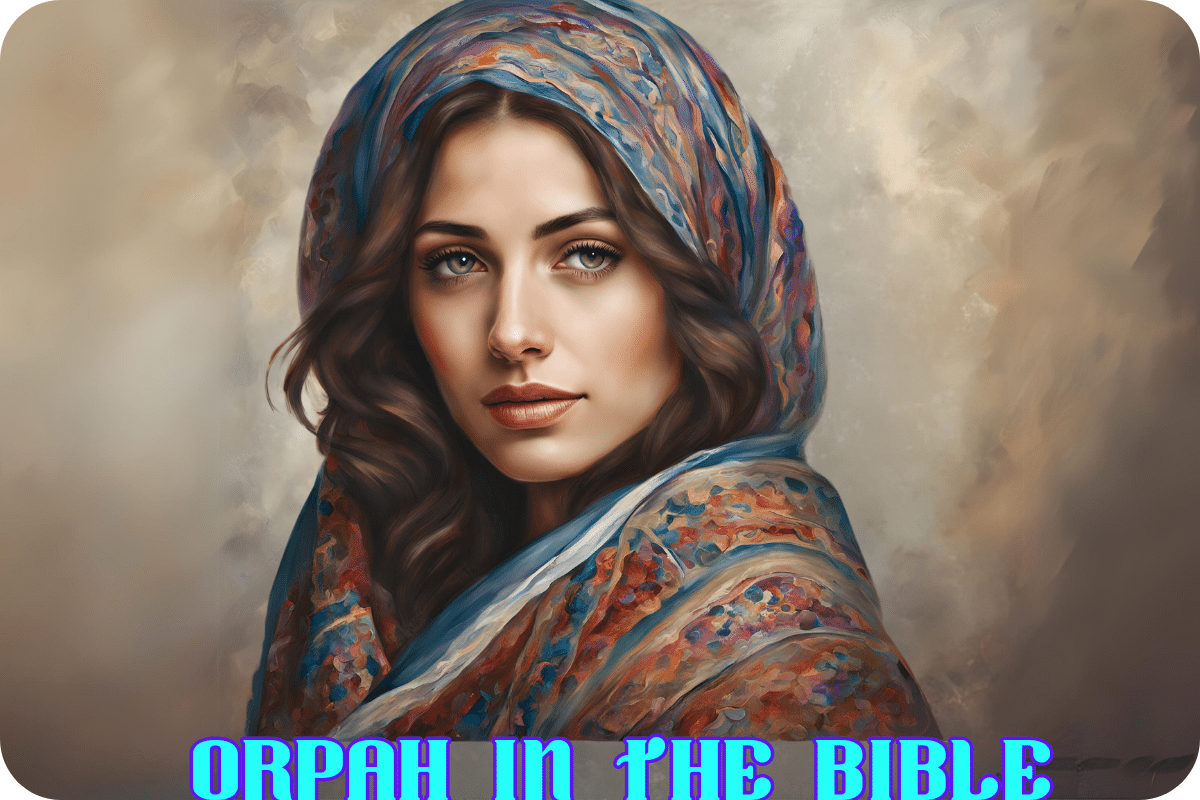OPTIMISTIC ORPAH IN THE BIBLE
The story of Orpah in the Bible, highlights the complexities of human decisions and the consequences they can have. While her sister-in-law Ruth is celebrated for her unwavering loyalty to Naomi, Orpah’s choice to return to her homeland and people represents a different path. The Rabbis portray Orpah in an unfavorable light, seeing her decision as a rejection of Naomi’s faith and a return to idolatry. However, the biblical text simply states that she “went back to her people and her gods.”

The story of Orpah in the Bible, serves as a cautionary tale, showing how even those with potential for greatness can fall into darkness when they fail to fully commit to their beliefs. Her descendants, including the giant Goliath, would later oppose the Israelites, underscoring the high stakes of Orpah’s choice. Orpah’s story reminds us that even small decisions can have far-reaching impacts, both for individuals and for generations to come.
The Book of Ruth: A Brief Background
Context of Ruth
The Book of Ruth, set in the time of the Judges, offers a glimpse into the lives of a family facing famine, migration, and loss. It is a story that intertwines themes of loyalty, faith, and redemption against the backdrop of ancient Israelite society.
Main Characters in the Book of Ruth
Key figures in this narrative include Naomi, Ruth, and Boaz. Naomi, the matriarch, faces immense loss but finds hope through her daughter-in-law Ruth. Orpah, Ruth’s sister-in-law, plays a crucial yet often overlooked role in this story of survival and choice.
Who Was Orpah?
Orpah’s Family Background
Orpah, a Moabite woman, was married into an Israelite family that had migrated to Moab due to famine. She became part of this family through her marriage to Mahlon, Naomi’s son. Her cultural and familial ties were rooted in Moabite traditions, which deeply influenced her choices. When Naomi decided to return to Judah, Orpah in the Bible, chose to remain in Moab, her familiar homeland, rather than follow Naomi to an uncertain future. This decision, while pragmatic, was seen by the Rabbis as a rejection of Israelite faith.
Her Role in the Book of Ruth
Orpah’s primary role emerges during the critical moment when Naomi decides to return to Bethlehem after the death of her husband and sons. Orpah’s decision to stay in Moab, as opposed to Ruth’s choice to accompany Naomi, highlights the divergent paths taken by these two women.
Orpah’s Marriage to Mahlon
Mahlon’s Background
Mahlon’s marriage to Orpah represents the merging of Israelite and Moabite cultures. As Naomi’s elder son, Mahlon had settled in Moab with his family to escape the famine in Bethlehem. By taking Orpah as his wife, Mahlon facilitated Orpah’s integration into the Israelite family and faith.

This intermarriage, while accepted at the time, was later viewed negatively by the Rabbis as a violation of God’s command not to marry Moabite women. Mahlon’s choice to wed Orpah highlights the complexities of cultural identity and loyalty that would later shape the choices of his widow and sister-in-law, Ruth and Orpah, after his untimely death in Moab.
Life in Moab
Orpah’s marriage to Mahlon, an Israelite, represented a blending of cultures and faiths. Living in Moab, they would have navigated the complexities of a mixed-cultural marriage, balancing Moabite traditions with Israelite beliefs. While the biblical text does not provide extensive details, their decade-long union suggests a degree of mutual understanding and compromise.
The Tragedy in Moab
The Death of Elimelech
Elimelech’s death was the first devastating blow to Naomi’s family, leaving her and her sons as widows and migrants in the foreign land of Moab. This initial loss was then compounded when Naomi’s two sons, Mahlon and Chilion, also died childless. Naomi was now bereft of her husband and both her sons, leaving her alone with her Moabite daughters-in-law, Ruth and Orpah. This series of tragic losses left Naomi bitter and questioning God’s purpose, as she felt the “Almighty has brought calamity” upon her.
Loss of Mahlon and Chilion
The deaths of Mahlon and Chilion left Naomi bereft, triggering her decision to return to Bethlehem. This tragedy also thrust Orpah in the Bible and Ruth into widowhood, marking a pivotal turning point in their lives. Naomi urged her daughters-in-law to return to their Moabite families, but Ruth refused, pledging her loyalty to Naomi and the God of Israel. Orpah, on the other hand, heeded Naomi’s advice and returned to her Moabite roots. This divergence in their choices would have lasting consequences, as Ruth’s devotion led her to a remarkable redemption, while Orpah’s decision aligned her with Israel’s enemies.
Naomi’s Decision to Return to Bethlehem

Naomi’s Grief and Resolution
Naomi’s profound grief over the deaths of her husband and two sons drove her decision to return to her homeland of Bethlehem. Believing she had lost everything in Moab, Naomi urged her Moabite daughters-in-law, Orpah and Ruth, to return to their own families. While Orpah heeded Naomi’s advice, Ruth refused to abandon her mother-in-law, pledging her unwavering loyalty. Naomi’s personal tragedy and subsequent choice to go back to Bethlehem set the stage for the remarkable redemption story that would unfold through Ruth’s devotion and her marriage to Boaz.
Orpah and Ruth’s Dilemma
Naomi’s decision to return to Bethlehem presented Orpah in the Bible and Ruth with a pivotal choice. Staying in Moab offered the comfort of their familiar homeland and culture, while accompanying Naomi to Judah meant embracing an uncertain future in a foreign land. Orpah ultimately chose to remain in Moab, prioritizing the security of her Moabite roots. The divergent paths of Orpah and Ruth highlight the complex interplay between cultural identity, faith, and the high-stakes decisions that can shape one’s destiny.
The Crossroads: Orpah’s Choice
The Emotional Conflict of Orpah in the Bible
The decision of Orpah in the Bible, to return to Moab was a painful one, reflecting the depth of her internal conflict. Her tears and hesitation reveal the emotional turmoil she faced at the crossroads, torn between her loyalty to Naomi and the pull of her Moabite homeland, culture and family ties. Naomi urged her daughters-in-law to return to their mothers’ homes, expressing her desire for them to find security and kindness.
While Ruth emphatically refused to abandon Naomi, Orpah tearfully followed her mother-in-law’s wishes, prioritizing the comfort of her familiar roots over the uncertainty of accompanying Naomi to Judah. Orpah’s choice, though understandable, would ultimately lead her down a different path than Ruth’s remarkable redemption story.
Decision to Stay in Moab
The decision of Orpah in the Bible, to return to Moab, rather than accompany Naomi to Bethlehem, highlights her prioritization of her cultural roots and familiar surroundings over the uncertain journey to Naomi’s homeland. While Ruth’s unwavering loyalty to Naomi is celebrated, Orpah’s choice to remain in the comfort of her Moabite identity is viewed more negatively.
The story of Orpah in the Bible, serves as a cautionary tale, showing how even small decisions can have far-reaching consequences, as her descendants would later oppose the Israelites. Orpah’s tale provides a contrasting perspective on the complexities of cultural identity and the high stakes of one’s choices.
Analyzing Orpah’s Choice
Cultural and Personal Factors
The decision of Orpah in the Bible, to return to Moab was influenced by a complex interplay of factors. As a Moabite woman, she was deeply rooted in her cultural background and personal attachments. Staying in Moab meant remaining in a familiar environment where she had the support of her family and could maintain cultural continuity.
The social expectations of the time also likely played a role, as Orpah may have faced pressure to prioritize her Moabite identity over the uncertainty of accompanying Naomi to Bethlehem. Ultimately, the choice of Orpah in the Bible, reflected a desire for security and comfort in her known surroundings, even if it meant diverging from the path taken by her sister-in-law, Ruth.
Orpah vs. Ruth’s Decisions
Orpah and Ruth’s divergent decisions at the crossroads highlight the complexities of loyalty and courage. While Ruth’s unwavering commitment to Naomi and the God of Israel is celebrated, Orpah’s choice to return to her Moabite roots reflects a more pragmatic, culturally grounded response. Orpah in the Bible, prioritized the security and familiarity of her homeland over the uncertainty of accompanying Naomi to Bethlehem. Her story serves as a cautionary tale, showing how even small decisions can have far-reaching consequences. Ultimately, Orpah’s and Ruth’s contrasting choices underscore the high stakes involved in navigating one’s cultural identity and faith in the face of adversity.
Lessons from Orpah in the Bible
Embracing Personal Choice
Orpah’s decision to stay in Moab, despite the loyalty she felt toward Naomi, teaches us the importance of making personal choices that align with our own circumstances and well-being. Her choice reflects the value of understanding and following one’s path, even when it differs from those around us.
Respecting Cultural Identity
The story Orpah in the Bible, highlights the significance of cultural identity. By choosing to remain in Moab, she honors her roots and the life she knows. This teaches us to respect and stay true to our cultural heritage and the traditions that shape who we are.
Navigating Loss and Change
Orpah in the Bible, experienced profound loss with the deaths of her husband and father-in-law. Her story demonstrates resilience in the face of grief and the ability to find a way forward amidst life’s upheavals. It’s a lesson in adapting to change and finding new directions after significant loss.
Understanding Diverse Perspectives
The contrast between Orpah and Ruth’s decisions underscores the diversity of human experiences and choices. It teaches us to appreciate different perspectives and recognize that there is no single right way to respond to life’s challenges.
Strength in Pragmatism
Orpah’s choice to stay in Moab was practical and rooted in her immediate reality. This pragmatic approach teaches the strength found in making decisions that are sensible and feasible, emphasizing the importance of practicality in navigating life’s complexities.
Complexity of Loyalty
The story of Orpah in the Bible adds depth to the concept of loyalty. Her decision to stay does not imply a lack of loyalty but rather a different kind of commitment—to her family and culture in Moab. It teaches us that loyalty can take many forms and is not always about following someone else’s path.
Empathy and Support
By understanding Orpah’s choice, we learn empathy. Recognizing her reasons and the emotional turmoil she faced encourages us to be supportive of others’ decisions, even when they differ from our own. It reminds us to show compassion and understanding in our interactions.
The journey of Orpah in the Bible, though less celebrated, is rich with lessons about personal choice, cultural identity, resilience, diverse perspectives, pragmatism, loyalty, and empathy. Her story invites us to reflect on our own lives and the decisions we make, encouraging a broader understanding of the human experience.
Orpah in Jewish and Christian Tradition
Jewish Interpretations
In Jewish tradition, Orpah’s decision to return to Moab is often viewed with understanding, recognizing the powerful pull of her cultural and familial ties. Some interpretations suggest Orpah chose to return to a life of comfort and familiarity, which was a reasonable choice given her circumstances. While Orpah’s path diverged from Ruth’s remarkable redemption story, her decision reflected the complexities of navigating identity and loyalty in the face of adversity. The Rabbis’ portrayal of Orpah as an apostate is seen by some as an unfair judgment, as she simply prioritized the security of her Moabite roots over the uncertainty of accompanying Naomi to Bethlehem.
Christian Perspectives
Christian interpretations often contrast Orpah’s decision to return to Moab with Ruth’s unwavering faithfulness, portraying Ruth as an exemplar of devotion. However, Orpah’s choice can also be seen as a testament to the complex ways individuals navigate life’s challenges. While Ruth’s loyalty is celebrated, the decision of Orpah in the Bible reflects the pull of cultural roots and familial ties in the face of adversity.
Her story serves as a reminder that even when choices diverge, each individual must discern the path that aligns with their values and circumstances. Ultimately, Orpah’s and Ruth’s contrasting responses underscore the diversity of human experience and the high stakes involved in making difficult decisions.
Characteristics of Orpah in the Bible

Loyal
Orpah in the Bible, demonstrated loyalty to her family, particularly to Naomi, her mother-in-law. Despite her ultimate decision to stay in Moab, her initial willingness to accompany Naomi back to Bethlehem shows her dedication and affection.
Courageous
Facing the deaths of her husband and father-in-law, Orpah in the Bible, showed courage in dealing with profound loss. Her ability to continue living and make difficult decisions in the aftermath of these tragedies highlights her bravery.
Pragmatic
Orpah’s decision to remain in Moab reveals her practical nature. She weighed her options and chose the path that offered stability and familiarity, showing her ability to make grounded, realistic decisions.
Emotional
Orpah’s tearful goodbye to Naomi illustrates her deep emotional capacity. She experienced genuine sorrow and internal conflict when deciding whether to stay in Moab or leave with Naomi, highlighting her sensitivity and emotional depth.
Culturally Rooted
Orpah’s choice to stay in Moab underscores her strong connection to her cultural roots. She valued her heritage and preferred to remain in the land of her birth, demonstrating her deep sense of cultural identity and belonging.
Resilient
Despite experiencing significant losses, Orpah showed resilience by continuing with her life in Moab. Her ability to cope with grief and find a path forward is a testament to her inner strength.
Respectful
Orpah’s respectful demeanor towards Naomi, even when choosing a different path, showcases her respect for others. She honored Naomi’s wishes and her own needs without causing conflict or resentment.
Faithful
Although her faith journey is less documented than Ruth’s, Orpah’s initial journey with Naomi towards Bethlehem indicates a degree of faith and willingness to consider a new life in a foreign land, reflecting her openness and belief.
Decisive
Orpah’s ability to make a clear decision in a difficult situation highlights her decisiveness. She evaluated her circumstances and made a choice that she felt was best for her, demonstrating her clarity and determination.
Empathetic
Her emotional farewell to Naomi and Ruth reveals Orpah’s empathy. She understood the pain of separation and the significance of their shared experiences, showing her compassion and understanding.
Orpah’s characteristics paint a picture of a loyal, courageous, and pragmatic woman who deeply valued her cultural roots and made difficult decisions with resilience and empathy. Her story, though brief, offers a rich tapestry of traits that contribute to the broader narrative of the Book of Ruth.
The Legacy of Orpah in the Bible, in Modern Culture
References in Literature
Orpah in the Bible, has been referenced in various literary works, often symbolizing the struggle between personal desires and familial duties. Her story resonates with themes of cultural identity and the difficult choices faced by individuals in diaspora communities.
Modern Symbolism of Orpah
In modern culture, Orpah’s decision is sometimes interpreted as a symbol of self-preservation and the complexities of staying true to one’s roots amidst change. Her narrative offers a counterpoint to the often romanticized notion of self-sacrifice for a greater good.
Misconceptions About Orpah
Common Misunderstandings
A common misconception about Orpah in the Bible, is that her choice was less noble or faithful compared to Ruth’s. This view overlooks the legitimate personal and cultural reasons behind her decision to stay in Moab.
Clarifying Orpah’s Role
The role of Orpah in the Bible, is not one of failure or lesser loyalty but rather a portrayal of a different response to similar circumstances. Her story adds depth to the understanding of individual choices in the face of adversity.
Conclusion
The story of Orpah in the Bible, though brief in the biblical narrative, is rich with themes of loyalty, cultural identity, and the complexity of human choices. Her decision to stay in Moab provides a valuable perspective on the diverse ways people navigate their loyalties and attachments. By examining Orpah’s journey, we gain a fuller appreciation of the varied responses to life’s challenges and the profound impact of personal and cultural context on decision-making.


1 thought on “56. OPTIMISTIC ORPAH IN THE BIBLE”